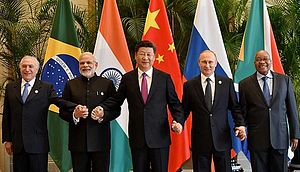As BRICS gets underway, the 2017 Brazil+China challenge comes to an end. Organized by the Asian branch of BRASA, a global network of overseas Brazilian students, the two-day forum brought together an unprecedented number of politicians, CEOs and intellectuals from both countries to discuss one key question: How can Sino-Brazilian relations be strengthened for the benefit of Brazilian society?
Different players provided different answers to this question. For consulting firms like Diagonal, the forum acted as a platform for establishing first contact with the growing number of Brazil-based Chinese companies.
Rodrigo Moraes, Director of Institutional and International Relations at Diagonal, observed that a fatal mistake macro-infrastructural development projects in Brazil often make is not interacting with the local communities affected.
Recognizing the impossibility of providing “bookshelf solutions” to problems within “living and dynamic territories,” Diagonal’s emphasis on local, specialized market knowledge echoes some of the remarks made by other keynote speakers.
Chen Duqing, former Chinese ambassador to Brazil, highlighted past failures of Chinese development projects due to “lack of sufficient market research.” Britaldo Soares, Chairman of the Board of Directors at AES Brasil, stated that any foreign company-led development project must learn how “to play the game in Brazil, with Brazilian rules, under the regulatory, institutional, and legal Brazilian framework.”
Other Brazilian companies looked to gain rather than offer technical expertise. The relationship between 99Taxis and Didi is a case in point.
On the surface, both seem to resemble Uber in their respective provision of a mobile transportation service system in large Brazilian and Chinese urban centers. However, Matheus Moraes, director of legal, public policy, and communication at 99Taxis, pointed out that both companies share an ambitious vision for the future: To “end traffic in big cities.”
As Moraes explains, the importance of AI for realizing such a vision is what brought 99Taxis to China. Only Didi possesses the AI know-how that in the very near future will automatically guide shared cars away from congestion hot-spots and towards the “right places and the right time,” thus making mobility in the city “seamless.”
Underlying the moves being made by such key decision-makers lies a crop of well-educated and ambitious young Brazilians eager to push innovative solutions for the benefit of their country. Vinicius Martison, co-president and chief operations officer of BRASA, hopes to improve the infrastructure of large Brazilian urban centers through AI. Currently majoring in computer science at the University of Florida, Martinson believes that the concept of a “smart city” — AI-driven data collection and analysis of a city’s infrastructural services — is something that Brazil can and should copy from China.
Indeed, such a learning process is already underway. Roberto Cláudio, mayor to Fortaleza — the fifth largest city in Brazil — was another speaker at the forum. But outside the conference room, he and his team have been looking for Chinese “smart city” solutions to Fortaleza’s violence problem. A trip to Shanghai-based security communication company ZTE has provided Cláudio with the technology necessary to implement one of his most important policies: integrating surveillance in private and public areas to create shared database that citizens, policemen, and government officials can all gain access to.
Such policies arguably clash with politically-sensitive issues such as privacy and Western notions of freedom. However, both politicians and businessmen at the forum were united in their belief that the societal impact of a solution was more important than its alignment with any political standard. As Moraes observed “Brazil and China are more similar than Brazil and the U.S. Do Americans have a problem buying a car? No. Do they have a problem with Internet? No. Do they have cities that grow too fast? No. Although we have different cultures, our challenges are similar.”
Remarks such as these and others throughout the two-day conference highlight an alignment with the BRICS paradigm. Professor Wang Wen, executive dean of the Choyang Institute for Financial Studies, defined the current status quo as that of a “post-Western world,” going on to criticize Francis Fukuyama’s famous, but now obsolete, “End of History” argument.
Otávio Costa Miranda, 23, co-founder of BRASA Asia, pointed out that the success of China’s development model “represents a big provocation to the West.” In spite of evident differences in political structure, Costa Miranda observed that the shared vigor with which both nation-states have pursued anti-corruption and working-class protection campaigns shows how there are similarities amidst the differences.
Sunday marked the opening of the 9th BRICS Summit in Xiamen, China. President Xi Jinping’s opening address described BRICS as a “task force that gets things done” rather than a “talking shop.” Organizers of the recent two-day forum, such as Vinicius Martinson, describe the Brazil+China Challenge in similar practice-centered terms. The purpose is not to just “discuss problems and Brazil’s faults but to bring Brazilian decision-makers with Chinese innovators and intellectuals to create solutions with the goal of implementing them in the very near future.”
With politically-sensitive issues such as the Korean Peninsula and terrorism on the BRICS agenda, forums such as these provide an alternative space where practical needs will always trump geopolitical power play. By prioritizing the needs and problems of the average Brazilian consumer-citizens, politics and international relations were for once placed in the service of wider society.
Eduardo Baptista is a graduate of the University of Cambridge and currently studying at the Yenching Academy in Peking University.

































